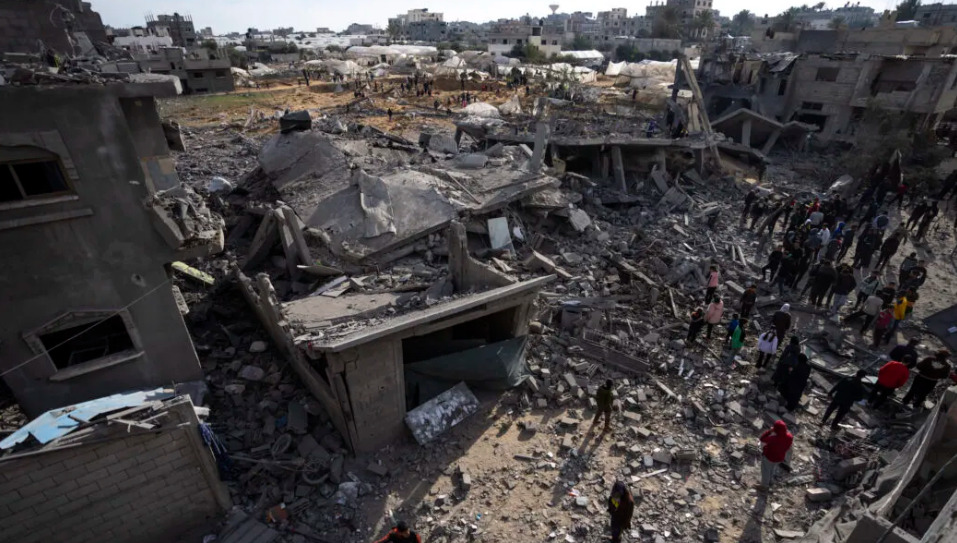
Erika Ayers Badan: You Are The Problem (And The Solution)
This is an episode for people grappling with how to manage and how to embrace AI. Good managers in the future will seamlessly balance being…
Thought Leader: Erika Ayers Badan

This piece features former U.S. Secretary of Defense, Mark Esper.
Israel‘s military has returned to northern Gaza to take on Hamas several months after claiming to have dismantled the group in the area.
Rear Adm. Daniel Hagari, Israeli military spokesman, said on Jan. 8 that the army has “completed the dismantling of Hamas’s military framework in the northern Gaza Strip,” and yet he told Agence France-Presse on Friday, “Hamas was in complete control here in Jabalia until we arrived a few days ago.”
His comments, roughly five months apart, highlight the complex and difficult realities of achieving Israeli leaders’ goals of destroying Hamas militarily and removing them from their governing position.
“The combat teams of the 7th and 460th Parachute Brigades under the 98th Division expanded during the day the fighting spaces in Jabalia and deepened the operational control of the area,” the IDF said on X.
Israeli troops started their military operations in northern Gaza and have progressively moved south in a sweep of the enclave. But they have not occupied the area they’ve swept, instead leaving those areas effectively ungoverned, allowing for Hamas to attempt to reconstitute
“I’m a little surprised though, in terms of the IDF’s operations, that they’ve allowed Hamas to return to areas the military already cleared,” former U.S. Secretary of Defense Mark Esper told the Washington Examiner. “I’m not sure why they’re doing that. I don’t know if it’s a manpower issue or what.“
This isn’t the first time Israeli forces have had to go back to a location in Gaza that it had previously operated in and vacated, though it highlights Hamas’s level of involvement permeating throughout the enclave. It has also raised questions about whether Israel is planning enough for what will happen in Gaza once the war is over.
“The key to this goal is military action and the establishment of a governing alternative in Gaza,” Israeli Defense Minister Yoav Gallant said Wednesday. “In the absence of such an alternative, only two negative options remain: Hamas’s rule in Gaza or Israeli military rule in Gaza. The meaning of indecision is choosing one of the negative options. It would erode our military achievements, lessen the pressure on Hamas, and sabotage the chances of achieving a framework for the release of hostages.”
Gallant argued, “The ‘day after Hamas’ will only be achieved with Palestinian entities taking control of Gaza, accompanied by international actors, establishing a governing alternative to Hamas’s rule,” though other politicians, like ultranationalist National Security Minister Itamar Ben Gvir, called for Israel to conquer the Gaza Strip and claim it as part of “the Holy Land” of the state of Israel.
The U.S. and several other entities have warned Israel against the forced displacement of the Palestinian people from Gaza.
Israeli Prime Minister Benjamin Netanyahu has not shared many details about the Israeli government’s plans for “the day after” the war completes, but he has repeatedly said Israel will likely maintain security control over the enclave. Forces have, however, begun fortifying a strategic corridor that splits Gaza in two, including building bases and taking over civilian structures, according to the Washington Post.
As Israeli forces returned to northern Gaza, they continued their limited operations in the southern Gaza city of Rafah. There are more than a million Palestinians who have fled to Rafah due to Israel’s military operations in the north, but it’s also where it’s believed Hamas’s four remaining in-tact battalions are sheltering.
World leaders, including President Joe Biden, have expressed grave concerns about the possibility that a full-scale invasion of Rafah could result in the deaths of countless civilians.
Biden threatened to withhold future offensive military aid sales if Israel invaded Rafah, while Israel has carried out limited operations so far as Israeli leaders have repeatedly stated their intention to carry out an invasion.
Israel seems “to be positioning forces to” invade Rafah, Esper said, adding that it is “also likely a negotiating tactic to put pressure on Hamas.”
The U.S. instead believes Israel should rely on precise military operations to take out Hamas leaders in Rafah, though Esper does not believe that is a feasible strategy given Hamas’s capabilities.
The administration “has talked about Israel relying on special forces operations when it comes to Rafah, where you enter the city in a limited fashion to capture or kill militants,” he said. “I just think that’s very difficult and dangerous to do. Hamas has four organized battalions in Rafah. The only way you can dismantle them is to go in force-on-force at the tactical level. I think you have to go block by block, building by building, because you not only want to destroy the militant units, you also want to make sure you uncover as many of the tunnels as possible, and that means checking every block and building.”
Biden’s administration paused one aid package earlier this month, which included 1,800 2,000-pound bombs and 1,700 500-pound bombs, according to Maj. Gen. Patrick Ryder.
“I think the mistake in holding up the sale of 2,000 lb bombs is less about the capability it denies the IDF in the short term and more about the signal it sends to Israel’s adversaries. What it tells Hamas is that the divide between Tel Aviv and Washington is growing, and they should just continue to wait out the negotiations because the situation continues to get better for them,” the former secretary added.
The death toll is impossible to verify. The Hamas-controlled Gaza Health Ministry has said roughly 35,000 people have been killed, which does not specify how many of them were terrorists, while Netanyahu recently said the death toll is about 30,000 people, 14,000 of which were militants.
Erika Ayers Badan: You Are The Problem (And The Solution)
This is an episode for people grappling with how to manage and how to embrace AI. Good managers in the future will seamlessly balance being…
Thought Leader: Erika Ayers Badan
Patrick McGee: Tesla’s Robotaxi Bait and Switch
Elon Musk called self-driving cars a ‘solved problem’ 10 years ago. So how come he’s still working on it? In a new column, Patrick McGee…
Thought Leader: Patrick McGee
Mike Pence on U.S. Leadership and Global Strategy
Former Vice President of the United States, Mike Pence, shares his thoughts about President Trump’s framework on trying to acquire Greenland, and discusses what he…
Thought Leader: Mike Pence

